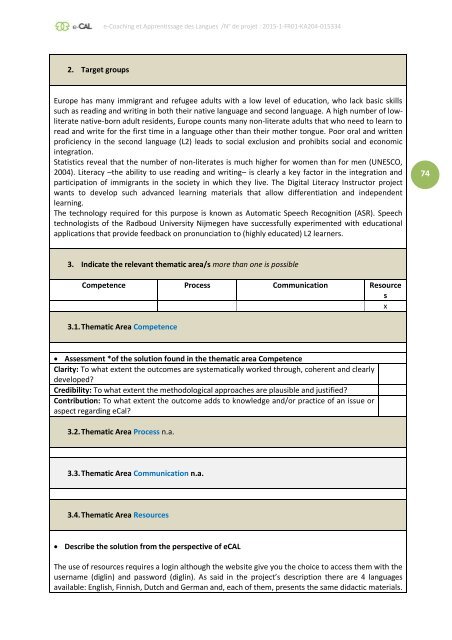e-CAL - e-Coaching et Apprentissage des Langues
The ERASMUS+ project e-CAL presents the result of an analysis of support methods in the case of language learning using web-based Open Educational Resources (OER).
The ERASMUS+ project e-CAL presents the result of an analysis of support methods in the case of language learning using web-based Open Educational Resources (OER).
You also want an ePaper? Increase the reach of your titles
YUMPU automatically turns print PDFs into web optimized ePapers that Google loves.
e-<strong>Coaching</strong> <strong>et</strong> <strong>Apprentissage</strong> <strong>des</strong> <strong>Langues</strong> /N° de proj<strong>et</strong> : 2015-1-FR01-KA204-015334<br />
2. Targ<strong>et</strong> groups<br />
Europe has many immigrant and refugee adults with a low level of education, who lack basic skills<br />
such as reading and writing in both their native language and second language. A high number of lowliterate<br />
native-born adult residents, Europe counts many non-literate adults that who need to learn to<br />
read and write for the first time in a language other than their mother tongue. Poor oral and written<br />
proficiency in the second language (L2) leads to social exclusion and prohibits social and economic<br />
integration.<br />
Statistics reveal that the number of non-literates is much higher for women than for men (UNESCO,<br />
2004). Literacy –the ability to use reading and writing– is clearly a key factor in the integration and<br />
participation of immigrants in the soci<strong>et</strong>y in which they live. The Digital Literacy Instructor project<br />
wants to develop such advanced learning materials that allow differentiation and independent<br />
learning.<br />
The technology required for this purpose is known as Automatic Speech Recognition (ASR). Speech<br />
technologists of the Radboud University Nijmegen have successfully experimented with educational<br />
applications that provide feedback on pronunciation to (highly educated) L2 learners.<br />
74<br />
3. Indicate the relevant thematic area/s more than one is possible<br />
Comp<strong>et</strong>ence Process Communication Resource<br />
s<br />
x<br />
3.1. Thematic Area Comp<strong>et</strong>ence<br />
Assessment *of the solution found in the thematic area Comp<strong>et</strong>ence<br />
Clarity: To what extent the outcomes are systematically worked through, coherent and clearly<br />
developed?<br />
Credibility: To what extent the m<strong>et</strong>hodological approaches are plausible and justified?<br />
Contribution: To what extent the outcome adds to knowledge and/or practice of an issue or<br />
aspect regarding eCal?<br />
3.2. Thematic Area Process n.a.<br />
3.3. Thematic Area Communication n.a.<br />
3.4. Thematic Area Resources<br />
Describe the solution from the perspective of e<strong>CAL</strong><br />
The use of resources requires a login although the website give you the choice to access them with the<br />
username (diglin) and password (diglin). As said in the project’s <strong>des</strong>cription there are 4 languages<br />
available: English, Finnish, Dutch and German and, each of them, presents the same didactic materials.


